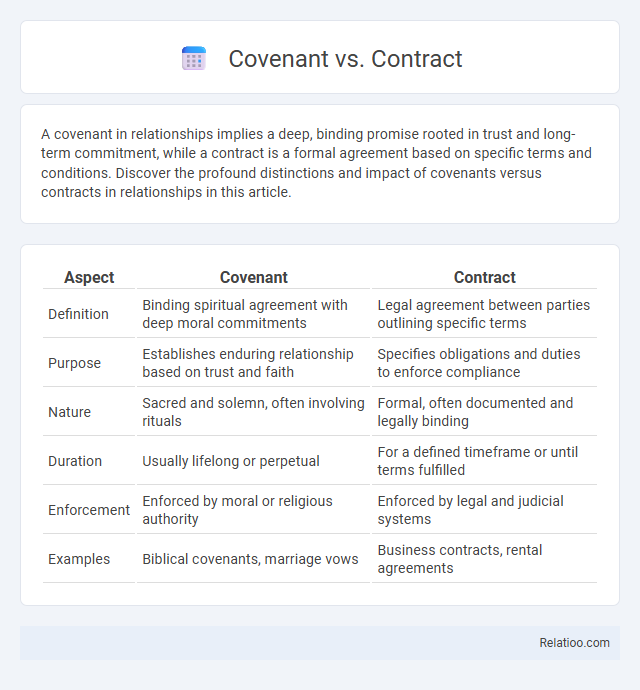A covenant in relationships implies a deep, binding promise rooted in trust and long-term commitment, while a contract is a formal agreement based on specific terms and conditions. Discover the profound distinctions and impact of covenants versus contracts in relationships in this article.
Table of Comparison
| Aspect | Covenant | Contract |
|---|---|---|
| Definition | Binding spiritual agreement with deep moral commitments | Legal agreement between parties outlining specific terms |
| Purpose | Establishes enduring relationship based on trust and faith | Specifies obligations and duties to enforce compliance |
| Nature | Sacred and solemn, often involving rituals | Formal, often documented and legally binding |
| Duration | Usually lifelong or perpetual | For a defined timeframe or until terms fulfilled |
| Enforcement | Enforced by moral or religious authority | Enforced by legal and judicial systems |
| Examples | Biblical covenants, marriage vows | Business contracts, rental agreements |
Understanding the Basics: Covenant vs Contract
A covenant is a solemn agreement that typically involves promises binding parties to specific obligations, often used in legal, real estate, and religious contexts, whereas a contract is a legally enforceable agreement between parties outlining mutual rights and duties. You should understand that while all contracts are agreements, not all covenants qualify as contracts because covenants can embody moral or spiritual commitments beyond legal enforceability. Recognizing the distinction helps clarify your obligations and rights in various legal and social scenarios.
Definitions: What is a Covenant?
A covenant is a legally binding promise or agreement between parties that imposes specific obligations or restrictions, often found in real estate and contract law. Unlike a contract, which is a mutual agreement creating enforceable rights and duties, a covenant specifically refers to a solemn pledge that can run with the land or bind successors. You must understand that covenants typically ensure certain actions or behaviors are maintained or prohibited over time, distinguishing them from general contractual terms.
Definitions: What is a Contract?
A contract is a legally binding agreement between two or more parties that creates mutual obligations enforceable by law. It typically involves an offer, acceptance, consideration, and a clear intention to create legal relations. Understanding the nature of your contract ensures you recognize your rights and responsibilities under this formal agreement.
Historical Origins of Covenants and Contracts
Covenants originated in ancient legal systems such as Mesopotamia and Biblical law, where they served as solemn agreements often invoking divine authority to ensure compliance and long-term relational commitments. Contracts have roots in Roman law, emphasizing enforceable promises between parties based on mutual consent and legal obligation, primarily focusing on commercial and civil transactions. The evolution of covenants emphasized moral and spiritual duties, whereas contracts developed into formalized legal instruments governing rights and duties in secular contexts.
Key Differences Between Covenant and Contract
A covenant is a solemn, binding promise often tied to moral or religious obligations, while a contract is a legally enforceable agreement between parties specifying mutual rights and duties. Covenants typically involve continuous or future performance obligations, whereas contracts may cover both one-time and ongoing obligations with clearer remedies for breach. Key differences include the nature of enforcement, underlying intent, and scope, where contracts emphasize legal terms and covenants focus on enduring promises beyond mere legal compliance.
Legal Implications: Covenant vs Contract
Covenants and contracts both impose legally binding obligations, but covenants often involve promises within deeds related to property use and restrictions, whereas contracts typically govern a broader array of agreements between parties. The legal implications of a covenant can include enforcement through property law remedies like injunctions or damages, while breach of contract generally results in monetary damages or specific performance. Understanding the distinction helps you assess enforceability and remedies tailored to the contractual or covenantual context.
Examples of Covenants in Practice
Covenants in practice often appear in real estate transactions where a property deed includes promises restricting land use, such as prohibiting commercial development in a residential neighborhood. Unlike contracts, which generally establish mutual obligations enforceable between parties, covenants specifically impose duties tied to property ownership or long-term agreements, like homeowners associations mandating maintenance standards. For example, a covenant may require a homeowner to maintain a fence or restrict building height to preserve community aesthetics, illustrating how covenants function as legally binding promises that govern property use beyond typical contractual terms.
Examples of Contracts in Practice
Contracts encompass legally binding agreements such as employment contracts, sales agreements, and lease contracts that outline specific obligations and rights between parties. Covenants, often seen in real estate transactions, involve promises to do or not do certain actions, like maintaining property standards in a residential lease. You should understand that while all covenants are contracts, not all contracts are covenants, with contracts generally covering a broader range of enforceable promises.
Choosing Between a Covenant and a Contract
Choosing between a covenant and a contract hinges on the level of commitment and enforceability required for Your agreement. A covenant often implies a solemn, binding promise with moral or ethical obligations, commonly used in real estate or religious contexts, while a contract is a legally enforceable agreement involving specific terms and conditions exchanged between parties. Understanding the nature of your commitment and the desired legal remedies helps determine whether a covenant's broader obligations or a contract's precise, enforceable terms best suit Your needs.
The Importance of Knowing the Distinction
Understanding the distinction between a covenant, contract, and agreement is crucial for legal clarity and effective communication. A covenant is a solemn promise or binding agreement often carrying spiritual or moral implications, whereas a contract is a legally enforceable arrangement defining specific obligations between parties. Recognizing these differences improves negotiation outcomes, enforcement strategies, and the interpretation of legal and doctrinal commitments.

Infographic: Covenant vs Contract
 relatioo.com
relatioo.com